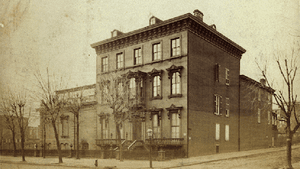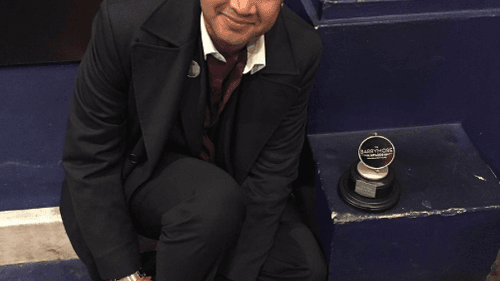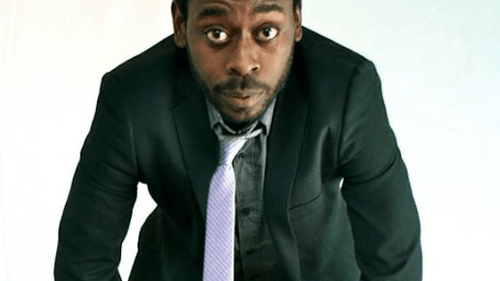Stay in the Loop
BSR publishes on a weekly schedule, with an email newsletter every Wednesday and Thursday morning. There’s no paywall, and subscribing is always free.
Freedom isn't free
Theatre Philadelphia hosts a Diversity Town Hall at New Freedom Theatre

Last night, Theatre Philadelphia hosted a “Diversity Town Hall Meeting” at New Freedom Theatre. Your reaction to the latter half of that sentence might range anywhere from, “That sounds nice,” to “Oh no, they didn’t.” Yes, they did. New Freedom is presently at the center of serious controversy, and for that reason, the event went about as well as could be expected, which is to say, not well at all.
Why are you here tonight?
To clarify, the meeting itself was a hopeful and, I believe, successful first step toward addressing diversity on and behind Philadelphia’s many stages. New Freedom’s newly appointed artistic director, Rajendra Ramoon Maharaj, and Theatre Horizon artistic director Erin Reilly, led the event, Maharaj prompting the crowd with questions such as “Why are you here tonight?” Incidentally, a security guard posted outside the building asked the same question of all attendees.
Members of the theater community who attended were indeed diverse, and the discussion respectful, if occasionally frustrated. Elements of African culture were woven throughout, as speakers held a carved “talking stick" and the evening ended with all holding hands, jumping, and shouting, “Ashé,” a Yoruba word that indicates the power to make change. After all, Freedom, celebrating its 50th anniversary season, is one of the country’s foremost African-American institutions and the only major Philadelphia producing house with an African-American artistic director.
So what was the problem? For those who haven’t been following along, in July, producing director Sandra Haughton cancelled Freedom’s summer student program and fired three longtime staffers: Patricia Scott-Hobbs, director of the company’s Barrymore Award-winning Performance Arts Training Program (PATP); Diane Leslie, director of PATP’s acting and workshops; and Gail Leslie, director of operations. Both Leslies are daughters of Freedom’s co-founder, Bob Leslie. The Philadelphia Tribune reported that all three, who worked at Freedom for decades, were told to pick a day and a two-hour time slot to clear their offices. Haughton's car was vandalized, and there were rumors that Freedom staff was threatened. To make matters worse, the women's exodus drew a crowd of friends, family, and media, and someone from the theater called the cops.
Protests and progress
Ever since, Freedom events have met with protests organized by company or school alumni, and many members of Philly’s theater community have pledged not to attend this or any other event until Haughton and the board are held to account. So, news of the town hall was met with some cynicism and requests that it be moved to a friendlier location. However, plenty of people, maybe 50 or so — artistic directors, actors, playwrights, administrators — still showed up, convinced the event would serve the greater good, which it did.

At the evening's start, Maharaj, who sits on Theatre Philadelphia’s board, noted, “kindness is the entry point,” and quoted Maya Angelou’s twist on Goethe’s three questions: “Do you see me? Did you hear me? And did what I say mean anything? That is what everybody is looking for.” Actor JaRon Battle explained diversity creates work for everyone by way of a rising tide lifting all boats. Theatre Exile producing artistic director Deborah Block admitted that for her, diversity means an expansion from her “point of origin.” Power Street Theatre Company founder Gabriela Sanchez bemoaned the tokenism she often experiences. Kash Goins, founder of GoKash Productions, issued a call for artists of color to canvas their own communities and help diversify audiences for shows wherever they work, so producing houses will be able to quantify the value of those audiences. Actor Lary Moten noted that at one major producing house, for one play, the entire cast was black, while every member of the theater’s staff was white.
It was a good conversation, one that ended with the promise of more to come. The crowd dispersed for wine, cheese, and some networking. And then, again, the cops arrived.
A threatened legacy
It’s shocking that anyone at this African-American company, knowing black people are far more likely to be arrested and imprisoned than other ethnic groups, on the same day another unarmed black man was filmed being shot dead in the road by an officer, would so cavalierly call in the police. But it’s even more shocking at a peaceful gathering to which the community was invited. With the wine and cheese still open for the taking, there was a commotion in the front hall, an unidentified man told everyone to leave, and those who went outside were barred from reentering. For reasons that are still unclear, Moten was handcuffed, and while he was ultimately released, it’s no exaggeration to say there was more than a little panic in the air.
For her part, Haughton says "Freedom is in the midst of change and some people aren't happy about it," and she "wanted the event to be as unproblematic as possible." She did not explain why the disturbance happened after the event or why Moten was targeted, saying only, "You'll have to trust me on this."
Adenrele Ojo-Allen, the daughter of Freedom’s other founder, John E. Allen, alleged that Haughton also called the police during an alumni protest at Saturday’s New Freedom open house, and attempted to deny her mother, Allen’s widow (and Freedom board member) Joyce Ojo-Allen, access to the building. She says her mother also showed up for the diversity meeting, and was denied entry there as well.

Outsider in, insider out
Though I’ve covered Freedom productions for the past 20 years, as an arts writer, I’m an outsider. So, I’ll let an insider explain why this was all so troubling. Here’s how playwright, director, actor, Villanova professor, and Barrymore and Haas Award winner James Ijames expressed his feelings in an open letter to New Freedom’s management and board:
“'You can’t come back into my theater.' Hearing that rang so false to me, so wrong…. That is not your theater. You may posess that building at present, but that theater belongs to the people. [It] belongs to black people and black stories and black history. [It is] proof of how far we’ve come and how far we have to go. That building is actually a National Historic Landmark…. Which is to say [it] belongs to everyone in attendance last night…. Its name is Freedom. You can’t own freedom. Freedom is inalienable. Freedom is open.”
Yes, freedom is open, but if the company continues to treat those who cherish its legacy so carelessly, I fear New Freedom Theatre won't be open much longer.
What, When, Where
The diversity conversation continues with an event hosted by Asian Arts Initiative, Philadelphia Asian Performing Artists, and InterAct Theatre Company.
Beyond Orientalism: The Philadelphia Forum. September 26, 2016 at Asian Arts Initiative, 1219 Vine St., Philadelphia. Eventbrite.com
Sign up for our newsletter
All of the week's new articles, all in one place. Sign up for the free weekly BSR newsletters, and don't miss a conversation.

 Wendy Rosenfield
Wendy Rosenfield